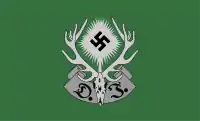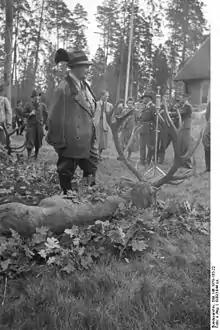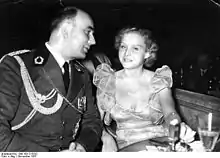Deutsche Jägerschaft
Reichsbund Deutsche Jägerschaft (German Hunting Society) was the official hunting society in Nazi Germany, 1934–1945. Membership was mandatory for all who possessed a hunting license.
 | |
| Formation | 1934 |
|---|---|
| Founder | Hermann Göring |
| Dissolved | 1945 |
| Legal status | Statutory corporation |
| Purpose | Improve hunting culture Propagate Nazi ideology |
| Headquarters | Berlin |
Membership | Mandatory |
Reichsjägermeister | Hermann Göring |
Oberstjägermeister | Ulrich Scherping |
Main organ | Der deutsche Jäger |
Origin
The Deutsche Jägerschaft was created through the Reichsjagdgesetz (National Hunting Act) of 1934. Existing hunting societies were disbanded and the membership transferred to the new society.[1]
Mission
Organization

The Deutsche Jägerschaft was a statutory corporation with mandatory membership for all who possessed a hunting license. The membership was in hunting matters subordinate to the jurisdiction of the Deutsche Jägerschaft through its system of honorary courts. Deutsche Jägerschaft was led by Hermann Göring, as Reichsjägermeister, and was governed by the Führerprinciple. Elected officials did not exist; all functionaries were appointed by their superiors in the internal chain of command. Goring's deputy and leader of the daily work was Walter von Keudell until 1937. Administrative leader was Oberstjägermeister Ulrich Scherping.[2]
"Deutsche Jägerschaft" was organized in a number of Jagdgaus. Some Länder had a Landesjägermeister as leader of the Gaujägermeisters. Each Jagdgau contained a number of Jagdkreise under a Kreisjägermeister. Each Jagdkreis had a number of Hegeringen (Game Management Areas) under a Hegeringsleiter.[2] Thüringen, for instance, formed a Jagdgau with 15 Jagdkreise that were state wildlife agencies.[4] The Institute für Jagdkunde (Hunting Science Institute) and the Deutsche Versuchsanstalt für Handfeuerwaffen (German Research Station for Small Arms) also came under the Deutsche Jägerschaft.[2]
Rank structure

- Reichsjägermeister Göring
- Oberstjägermeister Ulrich Scherping
- Landesjägermeister: Preussen (Göring); Baden; Bayern (Ritter von Epp); Hessen (Sprenger); Württemberg
- Stabsjägermeister Ostmark
- Gaujägermeister
- Kreisjägermeister
- Hegeringsleiter
Dissolution
The Allied Powers dissolved the Deutsche Jägerschaft in 1945, and its assets and properties were confiscated.[7]
Flags
 Reichsjäger-
Reichsjäger-
meister Staff of the Reichsjäger-
Staff of the Reichsjäger-
meister Members of the Reichsjagdrat
Members of the Reichsjagdrat
 Landes-
Landes-
jägermeister Gaujägermeister
Gaujägermeister Kreis-
Kreis-
jägermeister Ordinary Member
Ordinary Member
References
- "Jagdgesetz III – Das Reichsjagdgesetz von 1934." Wildwissen. Retrieved 2018-01-11.
- Deutsches Jagdleхikon: "Reichsbund Deutsche Jägerschaft" Retrieved 2018-01-11.
- Fünfzig Jahre Kreisjägerschaft Coesfeld, p. 14 Retrieved 2018-01-11.
- Archivportal Thüringen: "Jagdgau Thüringen - Kreisjägermeister für den Jagdkreis Weimar" 2013-06-14.
- Reichsbund Deutcher Jägerschaft Retrieved 2018-01-11.
- Organization of the Deutsche Jägerschaft Retrieved 2018-01-11.
- Laws and Orders of Military Government. Braunschweig: Vieweg, 1945, p. 10.